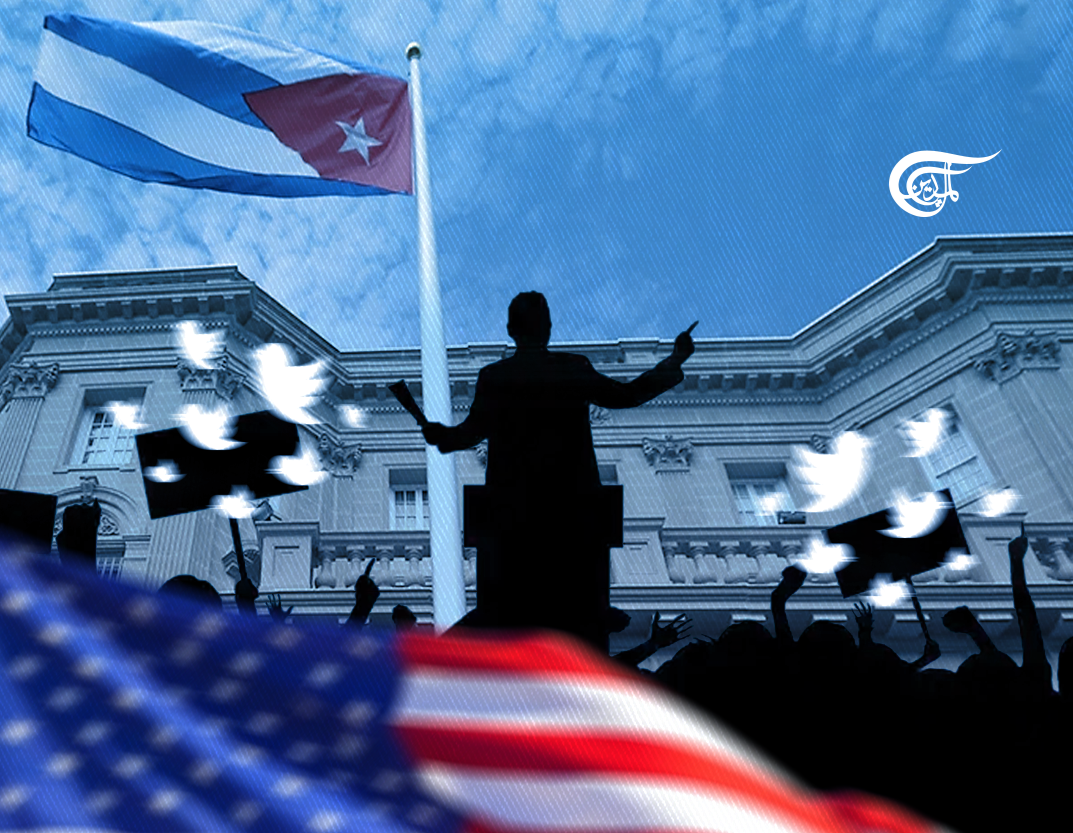A Steadfast Cuba, a Bitter US: Failing from the Bay of Pigs to a Thread of Tweets
There is no shortage of shady organizations, sketchy organizers, and other accounts that are clearly the fruits of the US’s investment.
Though COVID was well contained in Cuba for nearly the entirety of the pandemic, the impact of current economic conditions took its toll. In 2021, Cuba was forced to abandon the dual currency system, and at the beginning of this year, its exports witnessed a major decline by 40% and its economy in total by 11%. The sanctions, in addition to the liquidity problems caused by the slump after the country had imposed a strict lockdown to foreigners due to the pandemic, have exacerbated shortages, compounding the financial blow, damaging the growing tourist industry that provided Cuba with the necessary foreign reserves to stabilize its currency.
Spontaneous riots in Cuba took place in Havana in the last few days, attacking police vehicles and infrastructure, following the added pressure of pandemic and sanctions-driven conditions that were imposed on the tiny island. Some of the riotings aggravated the difficult conditions due to lockdown after the start of the global COVID-19; there is no doubt that it was largely the result of an intentional operation in the making of the pandemic, taking advantage of the current conditions to further US-backed efforts against Cuba.
In response to the intentional and long planned agitations against Havana, Cuban President Miguel Díaz-Canel mobilized his people to the streets, encouraging revolutionaries to “defiantly face” provocations, affirming that the Cuban streets are for the Cuban people. This was reinforced by the mass turnout of pro-Revolutionary demonstrations that responded to the relatively marginal rallies and riots of a few thousand.
-

‘Pro-democracy protest’ (left) vs pro-Revolutionary Government rally (right) -

‘Pro-democracy protest’ (left) vs pro-Revolutionary Government rally (right)
Yet amidst the struggling economic conditions, which no country was spared from, the most recent social media campaign waged against Cuba, accompanied by the #SOSCuba hashtag, was barely more convincing online. A simple search of the #SOSCuba hashtag reveals the usual arrangement of ops, accounts ranging from individuals with pro-regime change messages representing US and Canadian based “democracy promoting” organizations (some advocates of “internet freedom”) the usual Miami gusanos or outright bots from fake accounts.
Cuban Minister of Foreign Affairs Bruno Rodriguez Parrilla identified the disturbances as caused by a coordinated and intentional “communicational operation that has been prepared for a long time” with millions of “funds from the [US] government,” TeleSUR reported.
There is no shortage of shady organizations, sketchy organizers, and other accounts that are clearly the fruits of the US’s investment. Among these, we mention the so-called “Movimiento San Isidro”, posing as a pro-democracy group of artists, residing in the San Isidro neighborhood of Havana, whose engagement, followers, and retweets comprises US and European government officials and US Embassy members. A blue check revealed the users’ identity: “Cuba Decide”, “Voices of Cuba” (an American Museum of Natural History), “CubaNet” and “CiberCuba (a Florida-based data-driven news outlets); all publishing, posting and retweeting overlapping content from US officials, echoing calls for regime change and polishing infographics on Cuba’s alleged human rights abuses or missing protestors.
Predictably, US officials responded “right” on cue, such as Florida Mayor Franciz Suarez, who voiced “humanitarian” concerns of such mysterious digital activist psy-op accounts calling for “military intervention” in Cuba. On the other side, Republican Representative Anthony Sabatini threatened “high-ranking communist officials” on Twitter with an ultimatum: “Either immediately assist in the transition of government away from communism or be prosecuted and executed thereafter. #SOSCuba.”
The latest campaign came after the fallout of the latest UN General Assembly, which voted overwhelmingly to take measures and condemn the U.S. economic and financial blockade against Cuba. 184 nations voted in favour of the resolution, with just two brandishing veto: the US and “Israel.”
In 2016, Obama relaxed some of the trade and travel restrictions in the longstanding US economic embargo against Cuba, lobbied by USAID contractor and visual artist Alex Gross. The Jewish-American contractor, arrested from 2009 to 2014 for spying, was sent by USAID to build unfettered Internet lines for “Cuba’s Jewish community”. USAID would launch Zunzuneo – a secretly US social network built on texts to stir unrest and undermine the government, in line with USAID’s “political transition initiatives” for 2008-2010 whose aim was to “break the blockade on the island.”
Trump, having opted for more hardline tactics of sanctions and overt hostility, rolled back Obama’s 2016 rapprochement with Cuba, limiting tourism to the island through ending the “people to people” traveling category. His sanctions cost Cuba over $20 billion, with a $5.570 billion loss from April 2019 to March 2020. His rollbacks also threatened USAID’s activity towards Cuba, as under his administration there were proposals to cut billions in aid funding.
The Biden administration, armed with NGO assets in its cabinet and in its administrative bureaus, like former NED lead Shanthi Kalathil of the National Security Council, now the Coordinator for Democracy of Human Rights or CIA directors Andrea Kendall-Taylor, now the Senior Director for Russia and Central Asia and Avril Haines, the Director of National Intelligence that was formerly the Senate Foreign Relations Committee deputy chief council when Biden was Chairman. As a 2016 Rand Report summarized, the US intelligence community turned to replace direct warfare with soft power, enabling propaganda, the weaponization of information, cultural subversion, and even shuffling equipment and weapons towards regime change ends under the seemingly peaceful and diplomatic channels of embassies and civil society organizations.
Just weeks ago, USAID announced to offer $2 million in grants over a three year period to partner organizations, either as foreign NGO partners or as US organizations, to new “democracy promotion” programs aimed at pushing for “greater human rights and freedoms” and to “expand civil society’s impact”.
In order to operate covertly, and “maintain a low profile, USAID’s latest grant package also exempts partnering NGOs from adding “USAID markings to materials distributed on the island.”
Though the US remains steadfast in refusing to lift the sanctions, the 116th Congress has authorized an additional $20 million for “democracy promotion” programs, including $12.973 million for “broadcasting programs” on the Island. For the 1st session of the 117th Congress, assembling after the July 1st start of this fiscal year, $9,700,000 was budgeted for capital equipment of this broadcasting infrastructure. The latest campaign against Cuba was a project in the making, and preparing to launch in domino-style fashion after the coup against Haiti’s US-lackey, assisted by US-backed Columbian and Florida-based agents.
In summer 2019, USAID awarded $3 million to any organization that would “investigate” alleged “forced labor of Cuban medical personnel”, turning up farcical reports on BBC, the Wall Street Journal, and Human Rights Watch. The accusation was pushed in September of that year through a Congressional bill introduced earlier that year by Senators Robert Menendez and Marco Rubio, seeking to take action against Cuba and Cuban doctors on these false bases.
This effort was an obvious attempt at defaming Cuba as a “world medical power” whose people oriented medical services have won Nobel Prizes and accolades from the World Health Organization. Not only health care is free of charge, accessible, and within reach of every Cuban citizen, but Cuban medical brigades have famously been deployed worldwide to respond better to global pandemics, proven to have increased health outcomes in host nations.
Yet, farcical claims made by the anti-Cuban government were blaming the government’s lack of investment in the health sector, not sanctions, pretending that sanctions do not include food or medicine.
Of course, the grant was an obvious way to bribe journalists and organizations into a narrative that ran directly counter to reality. There was an additional $2 million sum, awarded in July 2019 to groups in charge of spreading (or fabricating) “awareness about the realities faced by Cuban citizens and failures of the Cuban revolution.”
Columbia, the regional hub for NGO funding and both US military and soft power influence, has been, along with Haiti, the main site for the export of intelligence and soft power operations against US antagonists in the region. The Haitian coup last week swept away the old neoliberal government, a US lackey that was no longer of use, in exchange for mobilizing a better response to the mobilization of assets against Cuba.
For 6 decades, the US has launched nonstop military, biological, and economic warfare attacks against Cuba’s people to discredit the successes of socialism and undermine its social and political commitment to cooperation, sovereignty, and true commitments to democracy and equality. It is because of socialism that Cuba continues to thrive.
There were 638 assassination attempts against Fidel Castro in his lifetime and, between 1959 and 1997, 5780 terrorist attacks were held against the Cuban people by the US government that have cost 3478 lives. Yet, the new “Bay of Tweets” seeks to mobilize a national and international consensus for regime change, enabled by farcical claims of “human rights” concerns and abuses. Cuba is used to challenges, and today is prepared to withstand and overthrow the failed attempts. It is rather the US that finds itself weakened: its output image downscaled on the Bay of Pigs, and could barely hold on to a thread of Tweets.

 Julia Kassem
Julia Kassem
 9 Min Read
9 Min Read













